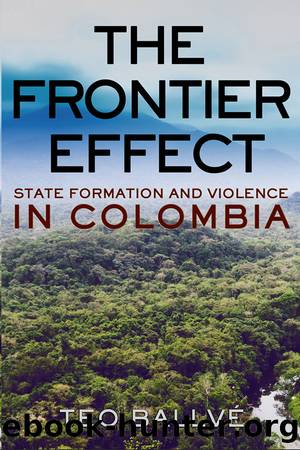The Frontier Effect by Teo Ballvé

Author:Teo Ballvé [Ballvé, Teo]
Language: eng
Format: epub
ISBN: 9781501747540
Barnesnoble:
Publisher: Cornell University Press
Published: 2020-03-15T00:00:00+00:00
Forests Make the State Arrive
Shortly into his first term President Uribe released an elaborate four-year plan for his administration. Titled âTowards a Communitarian State,â the three-hundred-page manifesto laid out a path designed to make the state more participatory, austere, managerial, responsible, transparent, efficient, and decentralizedâthe first paragraph of the text contains all of these words. Besides making assurances about ârecovering state authority,â the document promised that the implementation of the plan would help Colombians ârecover the feeling of the Stateâs presence in las regiones.â46
Uribeâs manifesto for a âcommunitarian stateâ bears chilling resemblances to the book by the paramilitary ideologue Ernesto Báez about âachieving peace through the construction of regions.â In fact, the written sentence of the court that convicted Báez pointed out these similarities, noting quite diplomatically that Uribeâs manifesto âcontains some concepts and narratives that share a certain likenessâ to those in Báezâs book.47 The judge then devoted four pages of the sentence to illustrate the word-for-word similarities with side-by-side comparisons of the two texts. Indeed, the regionalist politics of paramilitary populism squared perfectly with Uribeâs carefully crafted political persona as a hardworking paisa and a man of the people. Despite being born and raised in MedellÃn, his familyâs extensive rural landholdings in Antioquia and Córdoba allowed him to present himself as a straight-talking âman of the regionsâ with a soft spot for the countryside. Uribeâs style of populism, a mix of authoritarian militarism and paternalistic pastoralism, was perfectly summed up in his campaign slogan: Mano firme, corazón grande, meaning an iron fist against the FARC but a big heart for the common folk, especially those in the regions.
Uribe put USAIDâs alternative development programs at the center of his plans for stirring up the âfeeling of the Stateâs presence in las regiones.â His manifesto explained, âOur Development strategy in conflict zones draws on elements from Plan Colombia ⦠but incorporates a novel aspect by articulating the concept of alternative development with an emphasis on regional development based on increased productivity and the strengthening of institutions and communities as well as the improvement of physical and social infrastructures.â48 Alternative development was thus conceived as an elaborate, multiscalar process of state formation and âregional developmentâ that would not only foster âphysical and social infrastructuresâ but also link nationally directed state policies and programs with newly formed local- and community-scale organizations in las regiones.
One concrete policy proposal for accomplishing this elaborate model of state building was an âillicit crop-substitution program through forestry development projects and environmental services supported by conditional [cash] subsidies.â49 The idea evolved into the still-active Programa Familias Guardabosques (the Family Forest Rangers Program). Guardabosques, as it is known for short, is a conditional cash-transfer initiative that tries to turn farmers away from growing drug-related crops. During the Uribe administration the program was run by the now-defunct social welfare agency called Acción Social (Social Action) with assistance and money from the UNâs Office on Drugs and Crime (UNODC).
Campesinos joined Guardabosques by signing contracts with Acción Social in which they promised
Download
This site does not store any files on its server. We only index and link to content provided by other sites. Please contact the content providers to delete copyright contents if any and email us, we'll remove relevant links or contents immediately.
| Argentina | Bolivia |
| Brazil | Chile |
| Colombia | Ecuador |
| Guyana | Paraguay |
| Peru | Suriname |
| Uruguay | Venezuela |
Cat's cradle by Kurt Vonnegut(15335)
Pimp by Iceberg Slim(14488)
4 3 2 1: A Novel by Paul Auster(12375)
Underground: A Human History of the Worlds Beneath Our Feet by Will Hunt(12090)
The Radium Girls by Kate Moore(12018)
Wiseguy by Nicholas Pileggi(5770)
The Fire Next Time by James Baldwin(5431)
Perfect Rhythm by Jae(5398)
American History Stories, Volume III (Yesterday's Classics) by Pratt Mara L(5300)
Paper Towns by Green John(5179)
Pale Blue Dot by Carl Sagan(4996)
A Higher Loyalty: Truth, Lies, and Leadership by James Comey(4954)
The Mayflower and the Pilgrims' New World by Nathaniel Philbrick(4493)
The Doomsday Machine by Daniel Ellsberg(4484)
Killers of the Flower Moon: The Osage Murders and the Birth of the FBI by David Grann(4435)
The Sympathizer by Viet Thanh Nguyen(4384)
Too Much and Not the Mood by Durga Chew-Bose(4337)
The Borden Murders by Sarah Miller(4313)
Sticky Fingers by Joe Hagan(4188)
